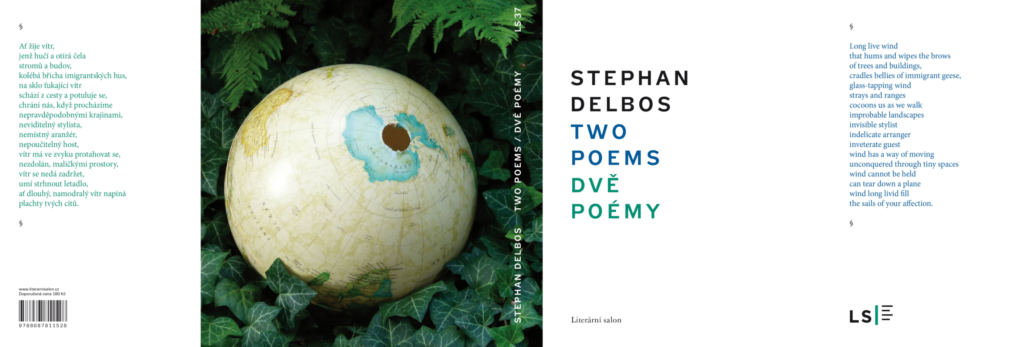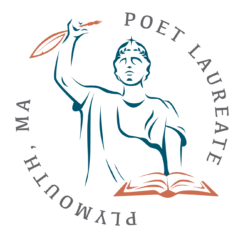“Delbos defies both baroque grandeur and gaudy ornamentation. At the same time, he has a distinct ability for unique poetic expression… He explores a transcendental quality of being, but manifested in interpersonal relationships.” –Milena Fucimanová, Tvar

Two Poems / Dvě poémy
A bilingual edition in English and Czech
Translated by Tereza Riedlbauchová and Radka Thea Otípková
Foreword by Tereza Riedlbauchová
The Literary Salon, 2021
124 pages
Reviews
“Delbos defies both baroque grandeur and gaudy ornamentation. At the same time, he has a distinct ability for unique poetic expression… He explores a transcendental quality of being, but manifested in interpersonal relationships. That is why it must be expressed immediately and naturally, without losing the perception of basic beauty, a natural feeling for light, color, and the melody of speech. Both poems have a sympathetic proportion of revealing metaphors and simple records. These proportions are an important attribute of beauty and significantly shift the poet’s message to multi-layered levels.” –Milena Fucimanová, Tvar
The American poet Stephan Delbos, who first visited Prague in 2003, links the worlds of Czech and Anglophone literature through his life and work. For Delbos’s first book in Czech, we selected two of his substantial poems, “Walking to Břevnov” from his collection In Memory of Fire (2017), and “A Child’s Guide to Candor” from his collection Small Talk (2021). “Walking to Břevnov” portrays the end of a love affair between two characters, Singleton and Stranger, in which Prague has played a central role. In “A Child’s Guide to Candor,” the narrator confronts the Czech and American worlds, at times speaking to his infant son and at times meditating on a parent’s responsibility in bequeathing speech. Concerns about contemporary events blend with the narrator’s admiration for the minute particulars of daily life, and with his memories of childhood and the lives and deaths of his relatives.
z poémy Walking to Břevnov/ Procházka na Břevnov
IV.
City where Soviet tanks
turn pink & sprout fountains,
City of snowy fingertips
& fists of rain,
Threshold bridge
whose river is a woman,
City of sisters silk and silver,
thighs and velvet cheekbones,
City of a man in fray-cuffed khakis
kicking wishes from a wilted dandelion,
City of din, city of breath,
a brick on my tongue.
IV.
Město, kde sovětské tanky
zrůžoví & naklíčí fontány,
město sněžných prstíků
& pěstí deště,
práh mostu,
jehož řeka je žena,
město sester z hedvábí a stříbra,
stehna a lícní kosti ze sametu,
město muže v uniformě s odřenými manžetami,
jenž z povadlé pampelišky vytřískává tužby,
město lomozu, město dechu,
cihla na mém jazyku.
z poémy A Child’s Guide to Candor/ Dětský návod na upřímnost
§
Vice light morning
covers night’s tracks.
Church light evening
inspires skyward faces.
Weekend laughter light
reminds us of ourselves.
Responsibility Monday light
brings back practicalities.
Showering now light
washes memory away.
Television disaster light.
Square window light why
we rent this apartment.
Photosynthesize
in these distances.
Voice light sunburn.
Or ocean light, my favorite,
crashing shadows, rainbow
sprays, triumph and display.
Honey light sunset.
Blue milky light dawn.
Light moves. Heavy light.
Grows and settles,
hides, returns.
§
Ráno za neřestného světla
zahlazuje stopy noci.
Večer za kostelního světla
zvedá tváře k nebi.
Světlo nedělního smíchu
nám připomíná nás samé.
Světlo uvážlivého pondělí
navrací praktické drobnosti.
Světlo sprchující přítomnosti
smývá paměť.
Světlo televizní pohromy.
Okna na náměstí osvětlují, proč
jsme pronajali tento byt.
Fotosyntetizuj
v těchto dálavách.
Spálení světlem hlasu.
Nebo světlo oceánu, mé oblíbené,
hroutící se stíny, duhová vodní
tříšť, triumf a podívaná.
Západ slunce za medového světla.
Svítání za mléčně modrého světla.
Světlo se hýbe. Těžké světlo.
Roste a usazuje se,
skrývá se, vrací.
§
In the cryptic,
post-apocalyptic light
of American morning,
when noon is a rumor
I redefine momentarily
my identity as father.
Snow glitters suburbs,
a world all albino;
I am stung with insomnia,
tongue bruised
from late wine
and an empty school bus,
obscene yellow, creeps
through these streets
named for felled trees.
My youth is a boy chewing gum
in a blank parking lot,
locked ice skating rink
10:15 pm; something
tells me I am still
there I am standing stiller
than this dawn,
awaiting a ride from one
car out of millions that’s familiar.
§
V kryptickém,
postapokalyptickém světle
amerického rána,
kdy poledne je pouhá fáma,
na chvíli předefinuji
svou identitu otce.
Sníh rozjasňuje předměstí,
svět celý jako albín;
štípe mě nespavost,
jazyk, modřina
od nočního vína,
a prázdný školní autobus,
obscénně žlutý, se šine
těmito ulicemi, jež nesou jména
pokácených stromů.
Moje mládí je kluk se žvýkačkou
na prázdném parkovišti,
zamčeném kluzišti,
10.15 odpoledne; něco
mi říká, že jsem stále
tam, jsem nehybnější
než tento úsvit
a čekám, že mě sveze jedno
auto, které je mi mezi milióny jiných povědomé.
§
We wind around
again to autumn,
season of his earthly birth,
mornings of bulb light
cavern the living room
against obsidian air
entrancing
the unpronounceable square.
No deception yet
flushes the soft saucers
of his cheeks, no
turmoil to rivet dread.
But somewhere, we know.
Across facades
buttressing the square
one by one windows
yawn with light,
constellations of families
and misanthropes
shuddering early
into evening.
§
Zase se vineme
zpět k podzimu,
času jeho pozemského zrodu,
jitra umělého světla
hloubí obývací pokoj
proti obsidiánovému vzduchu,
který hypnotizuje
nevyslovitelné náměstí.
Ještě žádným zklamáním
nezrudly mu měkké misky
tváří, žádný zmatek ještě
neochromil děs.
Ale kdesi, my víme.
Na fasádách
podepírajících náměstí
jedno okno za druhým
zívá světlem,
konstelace rodin
a misantropů
se třesou
zkraje večera.
